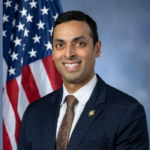A group of Democratic lawmakers from Maryland and Virginia has strongly criticized the U.S. Department of Agriculture’s (USDA) decision to reorganize the department by relocating several of its facilities from the National Capital Region to other parts of the country. The move, they said, would displace thousands of federal employees and compromise essential public services.
“This is a betrayal of American farmers” noted the lawmakers in a joint statement on July 24, 2025, denouncing the plan as an “attack on the federal workforce that will severely damage services that the American people depend on.”
“We are disappointed but not surprised that the Trump administration is continuing its attacks on the federal workforce, this time through wasting taxpayer dollars to relocate key USDA facilities,” the statement said.
The joint statement was signed by Representatives Suhas Subramanyam (D-VA-10), Donald S. Beyer, Jr. (D-VA-08), Sarah Elfreth (D-MD-03), Glenn Ivey (D-MD-04), Steny Hoyer (D-MD-05), Jamie Raskin (D-MD-08), Robert C. “Bobby” Scott (D-VA-03), Eugene Vindman (D-VA-07), and Senators Chris Van Hollen (D-MD), Angela Alsobrooks (D-MD), Mark Warner (D-VA), and Tim Kaine (D-VA).
The lawmakers criticized the relocations as haphazard and unlawful, asserting that they neither save taxpayer dollars nor improve agency efficiency.
“We’ve seen this tactic before, and we know that it only results in brain drain, crushed morale, and cuts to vital programs American farmers depend on,” the statement continued. “We will continue to stand up for the dedicated federal workers who provide critical services to our nation as they navigate these relocations, mass firings, and the administration’s continued attacks on the civil service.”
In a statement issued on July 24, U.S. Secretary of Agriculture Brooke L. Rollins defended the department’s decision.
“American agriculture feeds, clothes, and fuels this nation and the world, and it is long past time the Department better serve the great and patriotic farmers, ranchers, and producers we are mandated to support,” she said. “President Trump was elected to make real change in Washington, and we are doing just that by moving our key services outside the beltway and into great American cities across the country.”
Rollins added that the reorganization will be executed through a “transparent and common-sense process” that ensures USDA continues to deliver its essential health and public safety services. “We will do right by the great American people who we serve and with respect to the thousands of hardworking USDA employees who so nobly serve their country,” she said.
The lawmakers’ statement referenced prior disruptions under the Trump administration when, in 2018, the USDA relocated the Economic Research Service (ERS) and the National Institute of Food and Agriculture (NIFA) from Washington, D.C. to Kansas City, Missouri. According to a Government Accountability Office (GAO) study, these moves significantly undermined staffing and productivity:
- Over one-third of each agency’s permanent full-time staff left following the 2018 relocation announcement.
- Experienced staff (with more than two years on the job) declined from 83 per cent to 27 per cent between 2018 and 2021.
- ERS issued fewer critical reports, while NIFA took more than a month longer to process and award competitive grants in 2019.
GAO also found that the USDA failed to follow key relocation best practices, including not consulting staff and omitting critical variables, such as employee attrition, in its economic justifications.
“Both agencies have made positive improvements in these areas under the Biden administration, but the damage has already been done and many experienced, dedicated federal workers were essentially removed from their jobs,” the statement noted.
In response to the ongoing relocations, Democratic lawmakers introduced the COST of Relocations Act, in March 2025. The legislation, led by Congressman Suhas Subramanyam and Senator Chris Van Hollen, seeks to curb what they describe as President Trump’s “relentless effort to relocate federal agencies and decimate their workforces.”






